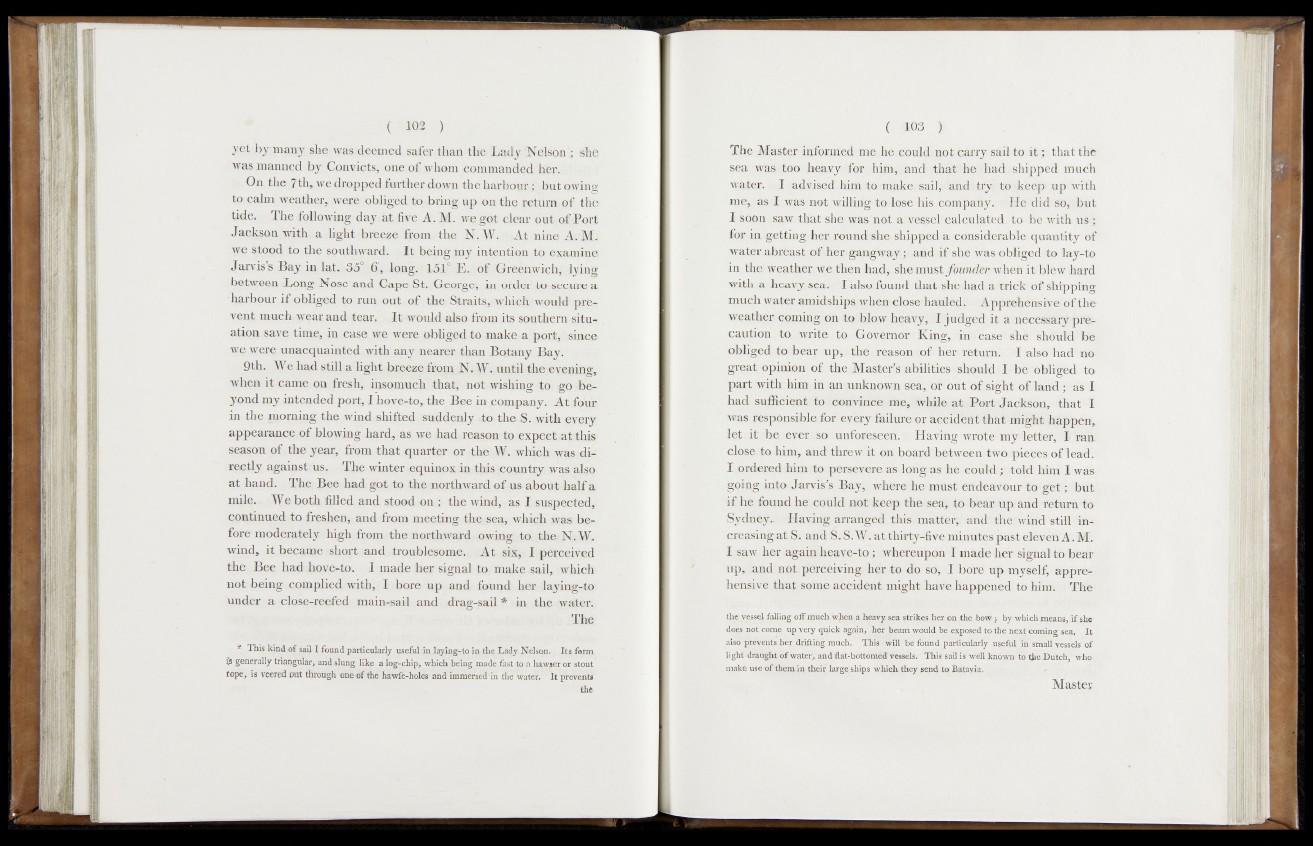
( p i I
she was-deemed safer than thejjBadyfM^lson'; she
was manned byCbnviets, o n c o f whom commandecLfer. ’
jpj On the,„7th, we dropped further down the harbour-; but ©win#
to calm weather,, were1 obliged to bring up on the retu r n the
tide. The -following day at five A. M. we .got clear out o#Jpor?fc
Jacksonwith a .lightbreege from the -N. W. »At nine A* M.
We stood to the southward. I t being my intention to examine
Jarvis a llay in lat. r3^0[',6,J long*- JS. of Greenwich, lying
between Bopg!Jl©se and Cape St.. Gepgge; in ofldeftoi secfcure'a
harbour if-ofriged to run out. of the Straifr,; which v^eu-ld pre-
¥ifes much, wear and tear. I t would also from its r
afron save time, in case we were obliged to make a port, sinefi
wewere unacquainted with any nearer than Botany Bay* ;
9th. We had stifr a light breeze frqg^NAY, untd thepy#ning,
when it came on fresh, insomuch that, not wishing to* gp-beyond
my intended port, I hove-to, the Bpe in company. A;t.four
in the morning the wind s h i f ty suddenly Jo the ^^with every
appearance o f blowing hard, as we had. reason- to .expect =at;this
season of the year, from that quarter or the YY. which wasrdfr
rectly against us. The winter equinox in this country ,was also
at hand. The; Bee had. got to the ^northward of-us about- half a
mile. We both filled and stood o n ; the wind, as I.suspectfdv
continued to freshen, and from meeting th^sea^ wfriph was- her
fore moderately, high from toe northward .owing, to to e ^ JY ,-
wind, it became < short and troubtesotoe. iiAt six, ppetepived
tim Bee had hovmto. I made her signal to: make >§ail, which
imfe Iming complied With, I bore up and fotmd her laying-to
under a close^reefed main-sail and. drag-sail*ijn the water.
i . The
* This-kind o f sail I found particialarly .usrfial.'wl^lp^to. I Its .farm
& -generally triangular, arid slung 1U® a Iqg-chip, w^ich being made fast jia a hawser or stout
tope, is Veered out fitariigh oneoftfce hawfe-holes' aOff imnSsed iii fi^w a tA ' * It prevents
f the
f. m s |
The Master informed me hecpould not carry sail to it r that the
sea ’W^s,.!f4o0k'heavyf4fQr,‘!,hi«i‘, and.’^tfet.the had .'shipped much
water. $j J . advised.him tcofnake.sail, anto.tryi to keep up with
me,-as I was.not willing,?to-,tese-his company., it He did so,1 but
1 soon .saw that ^he was not ■a‘^ e^ltealeulatedito,A<,fee with u s ;
for in gettoagtoei* frmnd'.toe shilpped^a considerable" quantity of
water, abreast^ .of hers gangway.;, and if she was obBgesd to lay-to
in the^ weather we. then had,- she must foiinckf when it M8w hard
with atoeavy, sea. I alsp. found that toe-had a trick of shipping
hfrldh water amidships.-when» dose hauledi Apprehensiv©|ofifbe
weather fepmihg on to‘blow heavy,' T judged it a necessary precaution.
to writd to )Governor"‘King,' in fia,s@!t she should be
obliged'to bear up,vtoesi reason of fe n return. I also had no
great opinion of the Master*» abilities-- should Ibeilobliged to
part with him in an unknown sea, or out of sight of land ; “as I
hndff ^pcfent to convince'me, while at. Port Jackson, that I
was responsible for' every failure or aeteidferit that might happen,
let it he/esdexiSso aufotoseefr. p H av'ing'Wrote fmy rletter, I ran
dtafc&'to himv and thtow it on board between two-pie^ek'bf lead-
I ordered him to persevere as. long, as he could ; fold him I whs
going into Jarvis’s Bay, wherehemust endeavour to g e t; but
if h e found he could not keep the-sea, to bear up and returhto
Sydney^'^Iaving arranged- this matter,'and “the wind still increasing
ahS; andS.S.'W.at thirty-five minufespasteleven-A. M.
I saw her again heave-to; whereupon I made her signal to bear
up, and not.perceiving her t© do so, I bore up myself, appre^
hensive.that some accident might have happened to him. The
the jiEsscl off mtidi when a heavy sea strikes her on the bow > hy. which means^ i f she
does not come up very quick again, -her beam wouH,^ exposed to the, nexp coa»ng sea. I t
also prevents her drifting much. 1 This'1 will b'e found^plmcullriy useful in small vessels of
light-draught -of water, and fiat-bottomfetTvessels. This saifik'well known to the Dutch, who.
make use of them, in their large &hip.s which, they send, to Batayia.
Master